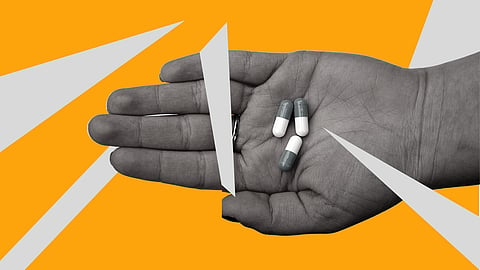

When the Covid19 epidemic swept across the globe in early 2020, chaos erupted among the masses. People had to maintain financial stability while also staying away from the path of the SARS-CoV-2 virus. This confusion was faced by the common man as well as the medical experts who initially had limited knowledge on how to prevent or treat the infected people.
Despite research findings that states antibiotics are not effective against viral infections, researchers found that people took antibiotics to prevent or treat the viral infection. Antibiotics are given at times to hospitalised Covid19 patients because of the possibility of a bacterial co-infection. “Antibiotics should only be given to patients who develop secondary bacterial illnesses,” Dr. Sumanth Gandra, an epidemiologist and associate professor of medicine at the Barnes-Jewish Hospital in the U.S., who was involved in the study, said in a statement.
This is a significant issue when you realise that the misuse and overuse of antibiotics is one of the driving factors for antimicrobial resistance (AMR). "Antibiotic resistance is one of the greatest threats to global public health," Gandra said.
A study conducted by Gandra along with her fellow researchers at Washington University found that antibiotic sales soared during the first COVID-19 wave in India last year. The study published in PLOS Medicine estimated that COVID-19 likely contributed to 216.4 million excess doses of antibiotics and 38 million more doses of azithromycin in adults from June 2020 through September 2020, a period of peak COVID-19 activity in India.
According to the World Health Organisation (WHO), "antimicrobial resistance (AMR) occurs when bacteria, viruses, fungi and parasites change over time and no longer respond to medicines making infections harder to treat and increasing the risk of disease spread, severe illness and death".
A report by WHO found a sixfold increase in the number of laboratory-confirmed bacterial infections caused by pathogens of concern in 2019, when compared to data from 2017. The findings of the report also conclude concerningly high rates of resistance in pathogens to antibiotics.
According to the report in PLOS Medicine, India is the largest antibiotic user in the world. During the Covid19 pandemic, Indian citizens took it upon themselves to prevent getting infected and started self-medicating, according to Dr. N K Ganguly, former director-general of the Indian Council of Medical Research (ICMR). To make matters worse, over-prescription of medicines is a cause for concern due to the unregulated and fragmented private healthcare sector which accounts for 75% of healthcare in India. "Antibiotic use should have gone down, but it didn't. Not only that but antibiotic use increased along with the rise of COVID cases," Gandra said.
“Low- and middle-income countries tend to skip diagnostic testing for respiratory illnesses because most patients cannot afford it, so they receive antibiotics under the assumption that their illness is bacterial," Gandra stated. The study also showed notable increases in the sales of doxycycline and faropenem, two antibiotics commonly used to treat respiratory infections.
To compare India's record of antibacterial use, the researchers compared the findings with the data from the United States and other high-income countries. They found that the use of adult anti-bacterial drugs in high-income countries fell drastically in 2020 compared to 2018 and 2019.
(With inputs from Press Trust of India)